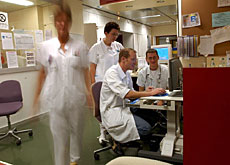Swiss explore potential of “telemedicine”

In Switzerland, the use of information and communications technology (ICT) to provide health services is just beginning to catch on.
The potential for so-called telemedicine is immense in terms of reduced costs and tailored healthcare.
Telemedicine may be defined as the use of ICTs to overcome a physical separation between the patient and doctor, or between a group of doctors.
At the end of September, specialists from the health and ICT sectors attended a conference in Bern to discuss the future of telemedicine.
The delegates were almost unanimous in the view that Switzerland has a long way to go. Some argued that telemedicine didn’t yet exist in the country, while others claimed it did exist but was disorganised.
“Telemedicine is available at some of the university hospitals,” said Michel Roulet of the Swiss Academy of Engineering Sciences. “But these systems are still too disorganised and virtually unknown.”
Geneva leads
The delegates singled out a project in canton Geneva as the most advanced example of telemedicine services in Switzerland.
The Iris Foundation has created a network providing patients in the canton, and their doctors, with access to their medical information through the use of a microchip card. For security reasons, the patient controls who can access his or her details.
Gerard Gobet of the Iris Foundation says the main advantage of this system is that it saves time for both patients and doctors.
“We will be able to cut down on unnecessary consultations, which often take place due to a lack of information,” he said.
The network is publicly funded and is expected to be operational by 2005.
Lifesaver
Telemedicine can even directly save lives, for example in the event of a cardiac arrest.
Immediate access to a heart attack patient’s file allows emergency services to quickly ascertain which specialist is required and where they can be located.
“There is another promising aspect of telemedicine,” says Roulet. “And that is the constant surveillance of people at risk of serious health problems, particularly the elderly.”
This surveillance system could include providing patients with a mini sensor that transmits their vital statistics to a health centre in real time.
Such a system would allow patients to stay at home where previously they may have had to stay in hospital for surveillance, thereby improving their quality of life and cutting healthcare costs.
Development programme
The Swiss Academy of Medical Sciences and the Swiss Academy of Engineering Sciences have asked the Swiss National Science Foundation to launch a nationwide telemedicine programme.
“It would be above all a development programme, because the technologies are ready,” said Roulet. “We just need to apply what is already there.”
This programme is expected to cost SFr100-150 million ($73-109 million). The proposal’s backers argue this figure is small compared to the SFr45 billion that the country spends on health each year.
Roulet says Switzerland has everything to gain from throwing itself behind telemedicine.
Aside from saving costs, he says, with its expertise in electronics, telecommunications and miniaturisation, Switzerland has the chance to become a leader in the global telemedicine market.
swissinfo, Marc-André Miserez (translation: Joanne Shields)
Telemedicine is the use of information and communications technology in medicine.
Telemedicine can be used to provide a confidential network of patient information, for use by both doctors and the patients themselves.
It can also be used as a surveillance system of patients deemed vulnerable, using mini sensors connected to a health centre.
The Swiss Academy of Medical Sciences and the Swiss Academy of Science Technology have asked the Swiss National Science Foundation to launch a nationwide telemedicine programme.

In compliance with the JTI standards
More: SWI swissinfo.ch certified by the Journalism Trust Initiative

You can find an overview of ongoing debates with our journalists here. Please join us!
If you want to start a conversation about a topic raised in this article or want to report factual errors, email us at english@swissinfo.ch.